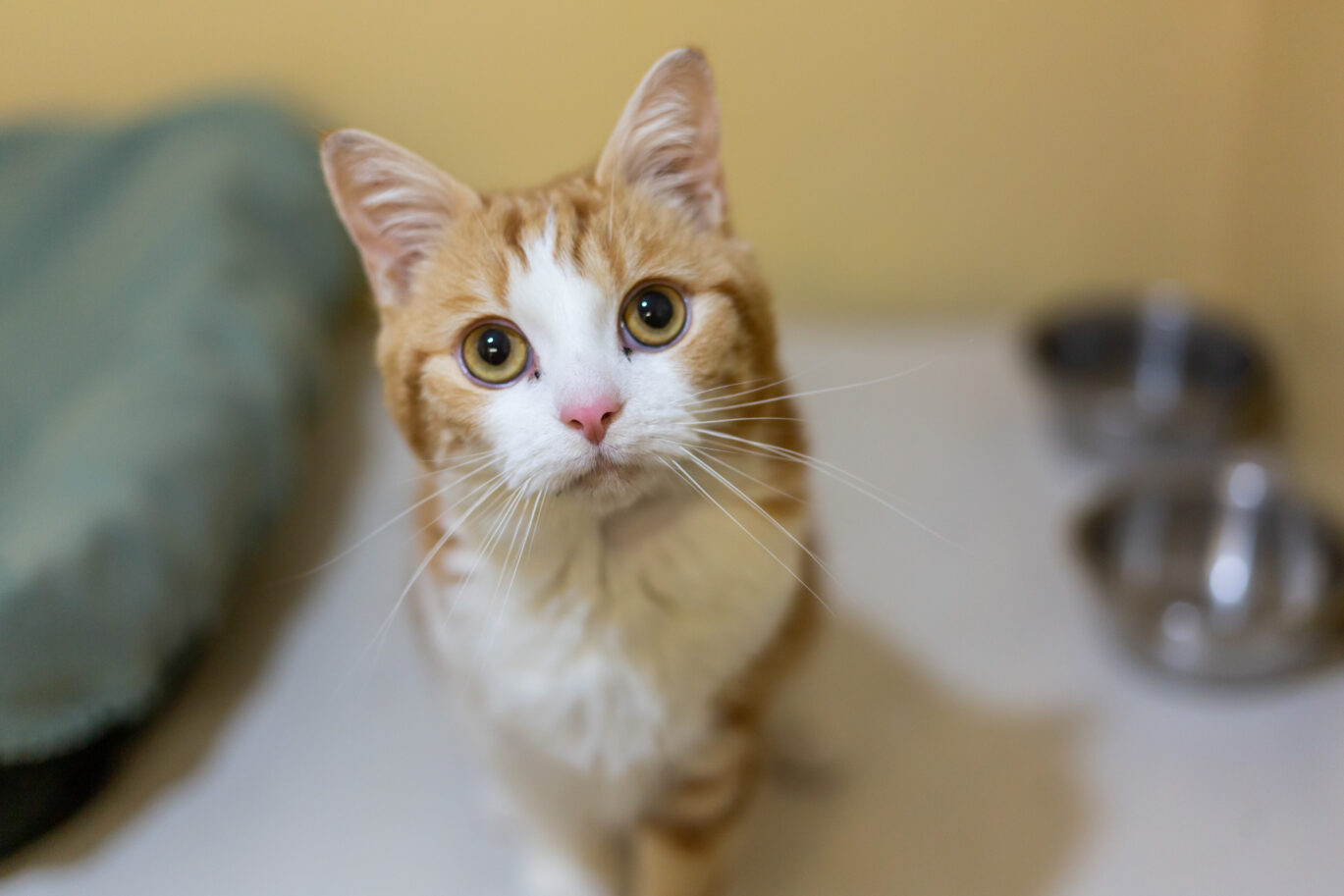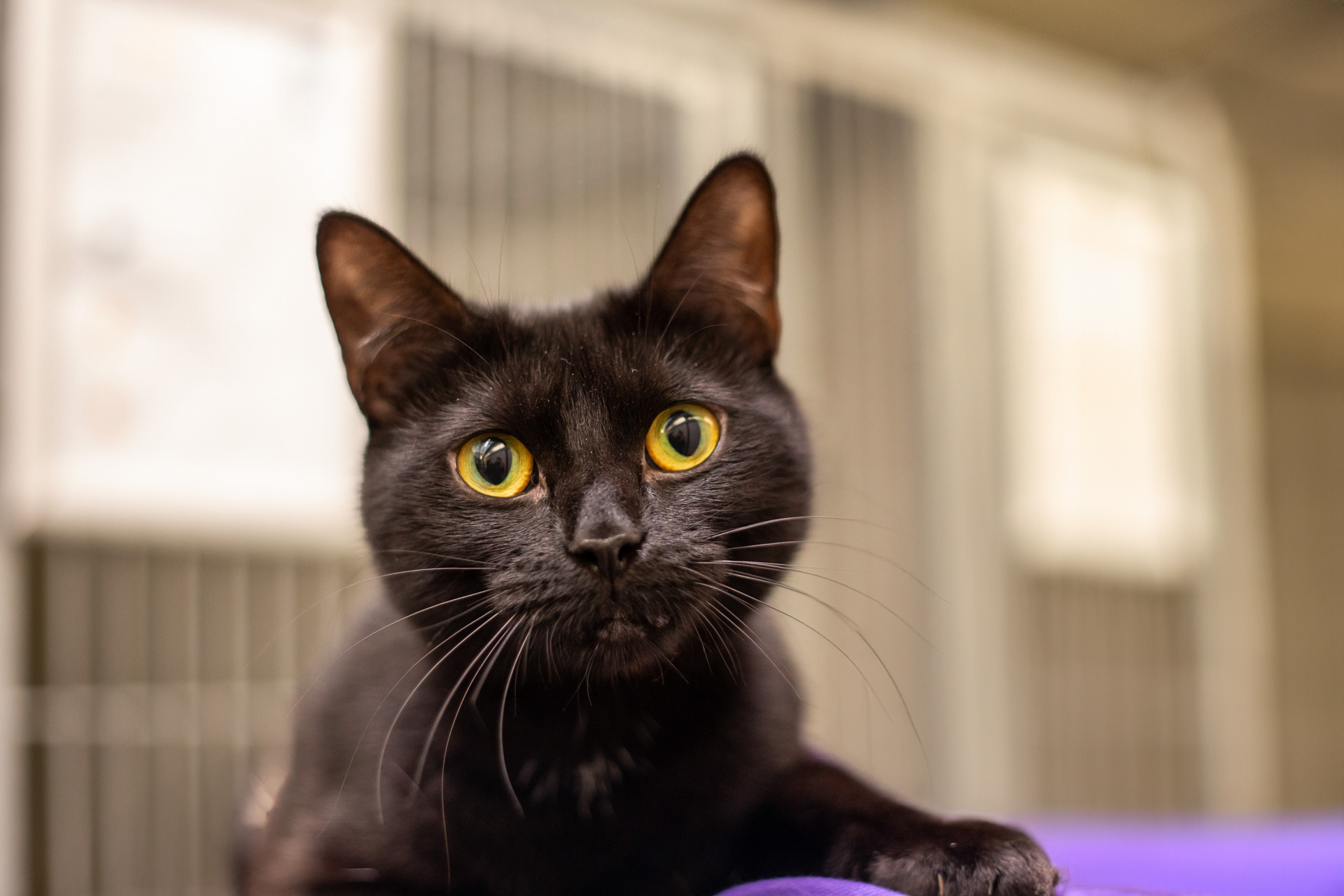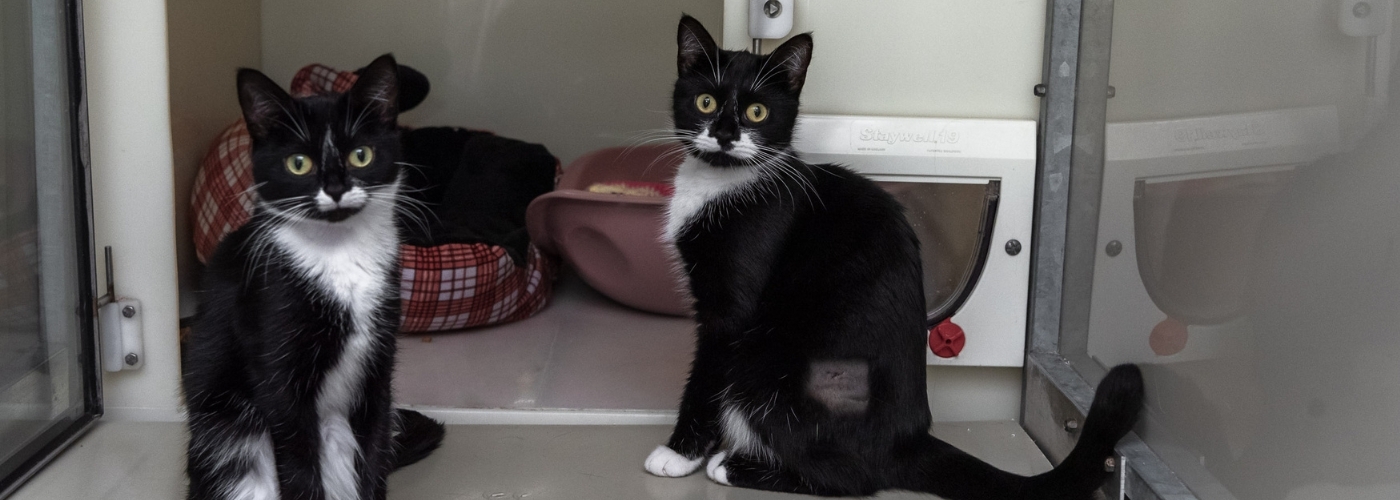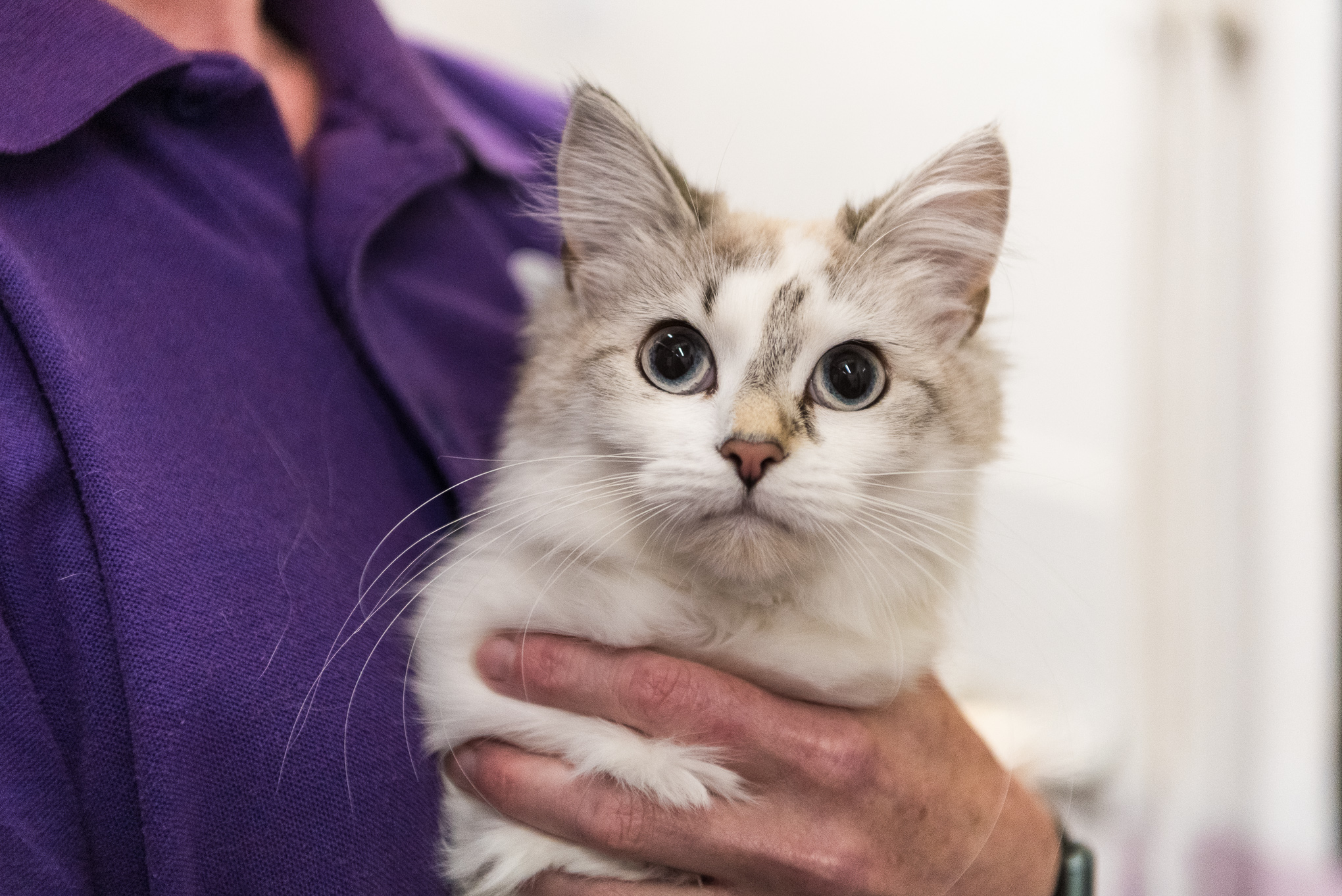
What can cats eat?
Everything you need to know about feeding your feline friend.
Choosing the right food for your cat is very important. As a cat owner, you must take responsibility for your feline friend and ensure that they are getting all the nutrients and protein that they need to thrive. Although it can be tempting treat your cat with scraps from the table, this guide makes clear the can’s and can not’s for feeding your furry counterpart.
What to feed your cat
Cats are obligate carnivores, meaning that their bodies require certain nutrients that can only be found in meat. This does not mean that they must eat only meat, but that their diet must contain predominantly meat. They cannot sustain an entirely vegetarian or vegan diet as it doesn’t provide the key nutrients that they need to live a happy, healthy life.
Choosing the right food in the pet food aisle can be overwhelming. You should choose something specially formulated for cats. Dog food, for example, doesn’t necessarily include the nutrients that your furry friend needs.
The best thing to choose is a ‘complete’ cat food from a reputable brand. ‘Complete’ food refers to food that includes all the needed nutrients for your cat, and in the right balance. ‘Complementary’ foods, however, refer to food that can only be used as snacks and treats, and not as a substitute for their main food intake. These foods are intended to be combined with others for a balanced diet and are to be fed in moderation.
Different cat foods can be intended for different ages. You should check that the food you’re buying is life-stage appropriate for your cat as it contains essential nutrients that support them and their health as they grow.
Kittens
Kittens have small stomachs and need lots of energy as they grow so they will require specific kitten food that is energy dense. They will need feeding little and often (4 times a day).
Adults (1-8 years)
Adult cats don’t require as much energy as kittens and need a different balance of nutrients to stay fit and healthy. They will need to be fed at least twice a day, usually more. If your cat prefers to be fed little and often that’s fine too, just be sure you don’t overfeed them.
Senior cats (over 8 years)
Senior cats often need more digestible protein as they grow older and may look to be fed little and often to meet their reduced appetite and calorie intake requirements. They require nutrients that support their aging muscles and organs.
Homemade cat food can be good for an occasional treat; however, it can be quite difficult to achieve the right balance of vitamins, minerals and proteins that are needed to sustain a healthy and balanced diet.
How to feed your cat
Cats often moderate their own food-intake, meaning you can leave food out for them throughout the day. However, they can also be tempted to overeat. Being overweight can impact your cat’s quality of life. To help combat this, you can engage in play sessions and feeding enrichment such as feeding puzzles where they can hunt and ‘win’ their food.
The amount of food you give your cat varies depending on age and activity level, just like us. Check your cat food labels for guidance on how much to give and make sure to weigh out their daily food allowance.
What ‘human food’ is safe for cats?
Although it’s tempting to share your dinner with your cat, we wouldn’t recommend giving them food that’s meant for humans as it’s hard to know how many calories are in it. Feeding them your food can also disrupt their balanced diet. Cats need more protein than other mammals, as well as specific amino acids which ‘human food’ cannot provide alone.
Vegetables
Cats don’t usually eat vegetables, so there’s no need to add them to their diet, but it is safe to feed them carrots, peas, corn, broccoli, or spinach. Other vegetables not listed here can cause issues.
Chicken
Cats can also eat cooked chicken, without bones and preferably boiled. This can be included as part of their daily food allowance and their balanced diet, however, feeding them this solely, or long term, can cause nutritional deficiencies.
Do not feed your cat raw chicken, or any raw meat, that is meant for human consumption. Raw meat that is meant for humans can contain higher levels of bacteria which are killed off when cooking.
Fish
A small amount of tuna can be fed to cats but not on a regular basis as it not only lacks essential nutrients, but tinned tuna can be high in mercury and salt which is harmful in large quantities. It can also make your cat gain weight quickly.
White fish can be given as a treat if cooked and the bones are removed, however, we only recommend giving a few pieces at a time.
What ‘human food’ ISN’T safe for cats?
Some of our favourite foods can cause serious health problems for our feline counterparts, so it’s important that you know what to keep away from your cat.
Chocolate
A firm favourite snack for us humans but for cats, chocolate is poisonous and even the smallest amount can do serious damage. This is due to the levels of theobromine which acts as a stimulant, increasing their heart rates. Cats struggle to metabolise this so the chemical stays in their bloodstream and quickly reaches dangerous levels.
Avocado
Our breakfast staple is high in fat content and contains a toxin called persin which can cause health problems for cats if eaten in high amounts.
Onion and Garlic
Onions and garlic are toxic to cats and can cause anaemia.
Grapes, Raisins, and Currants
Grapes, fresh or dried, can cause kidney failure.
Dairy
Despite popular belief, most cats are lactose intolerant and dairy products such as milk and cheese can upset their stomachs, leading to vomiting and diarrhoea.
Nuts
Most nuts, especially almonds, walnuts and macadamia, are high in fats and oils that can also make your cat feel unwell.
Coffee and Caffeine
Like chocolate, coffee and products containing caffeine contain methylxanthines which can be extremely toxic to cats.
Alcohol
Even the smallest amount of alcohol can cause health issues with your cat. This includes alcohol that’s found in household products such as ethanol.
As much as we love these foods as humans, they can be extremely harmful to your cat’s health so it’s important to store them out of reach and resist giving them table scraps.
What can and can’t cats drink?
To stay hydrated, cats only need water. Ensure your cat is getting fresh water at least once a day. Keep the bowl away from their food, litter tray or direct sunlight sources like windows which can sometimes deter them from drinking.
As we’ve already touched on, most cats are actually lactose intolerant so giving them milk will make them unwell.
If your cat refuses to drink water, you can boil some plain chicken breast or white fish and give them the cooking liquid to tempt them, ensuring there is no oil or salt in the water. Alternatively, try a water fountain as most cats prefer to drink running water.
Giving your cat treats
Your furry friend definitely deserves a treat from time to time, but make sure not to over feed them and don’t include treats as a daily part of their diet. As a treat you could offer them their usual food in a puzzle feeder, combining a treat and a play session without exceeding their allowance and disrupting their balanced diet.
Changing their food
Cats are creatures of habit and changing their food can cause problems. If you want to change what you’re feeding your cat, then do it slowly and carefully. Offer a little bit of the new food in a separate bowl alongside their usual food. If they like it, offer more each day, gradually reducing the amount of old food. Never mix the two foods together as it can put your cat off both.
Feeding your pregnant or post-natal cat
If your cat is pregnant or feeding her new kittens, you must provide additional nutrients by giving her high-protein kitten food. She will need an unlimited supply of this kitten food and fresh water.
That’s all you need to know for a well-fed feline
We hope this advice helps you to create a balanced, nutritious diet for your cat.
Please consider giving a one-off donation today to help us provide the right diet and nutrition for the cats that end up in our care.
Give a lifeline to an animal in need
Behind every wagging tail and gentle purr is an animal longing for love and safety. Your support doesn’t just change their circumstances, it gives them a second chance at life.
Many of the animals that end up in our care have come from difficult backgrounds – abandoned, abused or neglected – and it’s our mission to turn this around. At the Scottish SPCA, we provide more than just shelter, we offer healing, hope and a future, and with your help we can rewrite their stories.

Support us from £5 a month
It costs us £63,000 every day to continue the work that animals across Scotland depend on. Our work is only possible because of the generosity of people like you.





